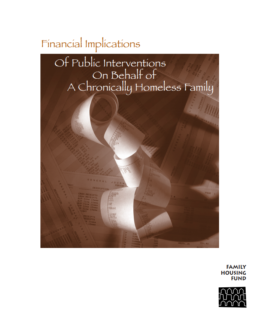Financial Implications of Public Interventions on Behalf of a Chronically Homeless Family
This report is supplemental material to a report Family Housing Fund published in January 2000, which proposes a model for a comprehensive supportive housing system combining affordable housing with intensive supportive services. To illustrate the cost-effectiveness of supportive housing, Family Housing Fund published this analysis to break down the cost of supporting a chronically homeless family with and without supportive housing.
Family Housing Fund was at the forefront of the Twin Cities’ supportive housing movement in the 1990s and early 2000s. At the time, housing experts around the country were experimenting with large supportive housing projects to address homelessness.
Supportive housing offers chronically homeless families consistent access to affordable housing services, and a strong community at a significant reduction in emergency interventions costs. This cost-analysis found supportive housing offers potential for significant cost reductions to public interventions, especially in the medical, academic development, and criminal justice sectors. While the housing and services associated with supportive housing present some higher costs at the outset, doing nothing produces far less satisfactory results and is ultimately more costly. A comprehensive system of long-term support can remedy the precipitating causes of homelessness.
Read more about the benefits of a supportive housing continuum.
